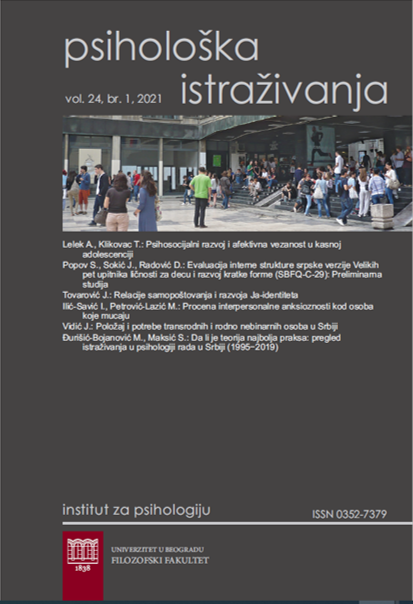Relacije samopoštovanja i razvoja Ja-identiteta
The relationships between self-esteem and ego-identity development
Author(s): Jelena TovarovićSubject(s): Psychology
Published by: Филозофски факултет, Универзитет у Београду
Keywords: Identity; Status; Self-esteem; Self-liking; Self-competence;
Summary/Abstract: Identity and self-esteem are important concepts in the development and understanding of individual’s self-perception. Perceptions and opinions of significant others influence the construction of adolescents’ representations of self and the formation of identity, which, in turn, can be a strong predictor of self-esteem. The significance of our research is reflected in the examination of subjective choices and commitment to roles, values and goals in the domains of religion, occupation, politics and relationships,which can all affect self-esteem. Hence, this paper aims to examine the relationship between identity and self-esteem, more precisely, the impact of identity on self-esteem. The study involved 487 adolescents who completed two questionnaires: the Extended Objective Measure of Ego Identity Status (EOMEIS-2), which contains four statuses: Achievement, Foreclosure, Diffusion identity and Moratorium, and the Self-Liking Self-Competence Scale (SLSC) used for the assessment of self-esteem, consisting of two dimensions: Self-liking and Self-competence. Correlation analysis of four identity statuses and two dimensions of self-esteem showed a positive correlation of Self competence and Self-liking with Achievement identity, and a negative correlation of the two dimensions of self-esteem with the Foreclosure, Diffusion identity and Moratorium. In order to analyze the influence of identity on self-esteem in more detail, a regression analysis was performed. When it comes to the dimensions of Self competenceand Self-liking, the most significant predictor is Achievement identity, while Moratorium and Foreclosure identity are less impactful predictors, with a negative sign. The results are interpreted in terms of the influence of identity on the level of self-esteem, as well as the importance of support from others, such as parents and peers. Finally, we provide guidelines for further research of the connection between identity, self-esteem and other concepts which play a significant role in the process of developing the concept of self.
Journal: Psihološka istraživanja
- Issue Year: 24/2021
- Issue No: 1
- Page Range: 49-62
- Page Count: 14
- Language: Serbian

